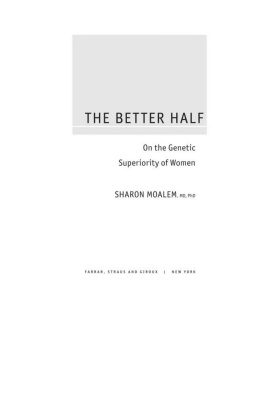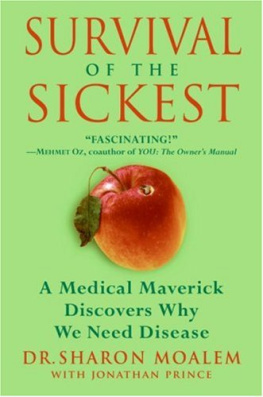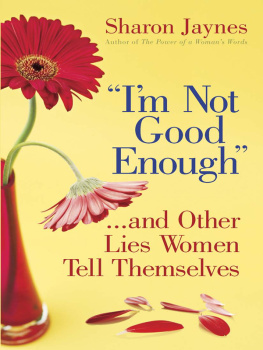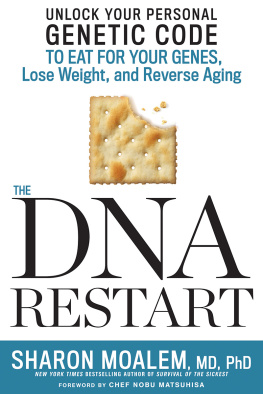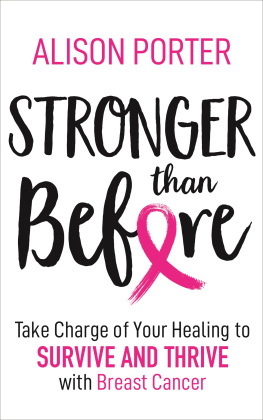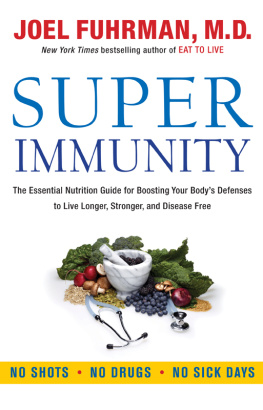The author and publisher have provided this e-book to you for your personal use only. You may not make this e-book publicly available in any way. Copyright infringement is against the law. If you believe the copy of this e-book you are reading infringes on the authors copyright, please notify the publisher at: us.macmillanusa.com/piracy.
I have undertakenas boldly as I can but not without shameto treat a topic previously ignored but by no means far from the truth, namely, the nobility and preeminence of the female sex.
Some of the names, case details, and identifying characteristics of people referenced in this book have been changed to protect the confidentiality of patients, colleagues, acquaintances, friends, and family. In some cases, scenarios and descriptions have been altered or combined to provide an added level of anonymity as well as to give clarity to an idea or diagnosis.
This book is intended as a reference volume only, not as a medical manual. It is not intended as a substitute for any treatment that may have been prescribed by your doctor. If you suspect that you have a medical problem, I urge you to seek competent medical help.
H ERE ARE SOME BASIC FACTS: Women live longer than men. Women have stronger immune systems. Women are less likely to suffer from a developmental disability, are more likely to see the world in a wider variety of colors, and overall are better at fighting cancer. Women are simply stronger than men at every stage of life. But why?
I became fixated on this question one summer night as I lay inside an ambulance speeding toward the hospital after a serious car accident. Lying on the stretcher, hooked up to the monitors, I found myself reflecting on two specific events in my past that had become vivid memories. One occurred when I was a doctor treating premature babies in a neonatal intensive care unit (NICU), and the other was ten years earlier, when I was focused on neurogenetics, working with people in their final years of life. The two events seemed connected in some way, but I couldnt quite put my finger on how.
Then, amid the chaotic activity in the back of that ambulance, the realization hit me. We all have those life events that make us question certain basic assumptions; the two things I thought about that summer night, and the crystallizing moment that followed, all link to the argument Ill be making in this book. And the thesis is this: women are genetically superior to men.
When I started doing research as a neurogeneticist (someone who specializes in the genetic mechanics of neurodegenerative disease), one of the unexpected challenges I experienced was recruiting sufficient numbers of healthy older adults to participate in the studies. Even with the perfect research questions and all the necessary financial support in place to test them, Id often be stymied and have to delay because I couldnt find healthy older age- and sex-matched volunteers. The recruitment process could take years.
Unless, of course, youve got Sarah on your side. Sarah is in her late eighties and has two titanium hips, but with her walker shes pretty much unstoppable. Her weekly schedule consists of a watercolor course, swimming, and a cardio class, rounded out with a regular dancing soiree. If that isnt enough, Sarah takes part in almost daily events at different senior centers across the city. Shes a member of a volunteer organization that visits hospitalized older adults who may not have any family or friends to spend time with them. She also happens to be my grandmother.
Im often asked by family members if Id be willing to speak to Sarah directly about slowing down. Everyone gets worried that shes simply too busy. My response to them is always the same: its because shes so active and draws so much meaning from her daily activities that shes doing as well as she is. More important, if she stopped being social, I would quickly run out of older adult research volunteers.
My grandmother first started helping me recruit for my studies almost twenty years ago. She wasnt shy about giving advice either. Youll never get one person wanting to help you with your study with that scary white lab coat and name tag on, she said. If I were you, Id try taking it off. And your nurse toono lab coats. They scare us. It reminds me of my surgeries, and why would I want that? Without it, you can just look like a normal person. After all, youre asking people to give up a piece of themselves, and thats a big deal. Youll seethere are many people who want to help.
So I listened, and I ditched the lab coat. It worked. After I, dressed like a civilian, gave a presentation to prospective volunteers, we had more than the number of research participants we needed. The only problem was that even if everyone in the room agreed to participate, there would always be a glaring shortage of individuals in one specific demographic group. There just werent enough men.
Elderly women on average outlive their male contemporaries by at least four to seven years. This longevity discrepancy becomes all the more striking as we start to approach the extreme end of the human life span. Over the age of eighty-five, women can outnumber men two to one. As for centenarians, womens survival advantage is even more exaggerated: out of one hundred centenarians alive today, eighty are women and only twenty are men.
FLASH FORWARD TEN YEARS to an early-autumn evening when the leaves had just started turning color. I was paged by the hospital to the NICU. Rebecca, the nurse on call, met me at the sink and briefed me on two preemies who had been admitted a few days before. Fraternal twins, Jordan and Emily were born at just twenty-five weeks of agemore than three months before their official due date. I put on a clean gown, blue nitrile gloves, and a mask, as the last thing these babies needed was to be exposed to anything I may have inadvertently tracked in from the hospital atrium, where Id been sitting just a few minutes before my pager went off.
Rebecca had been on staff with the hospital for more than three decades, and despite the long hours and the very difficult work in the NICU, she looked much younger than her sixty-odd years. Rebecca had one of those voices and ways of being that left you feeling reassured, no matter how dire the situation. Most of the staff, including many of the physicians, often deferred to her when thinking about changing a medical care plan for the hospitals smallest patients. The senior nurse in the Level 4 NICU, Rebecca truly was a preemie whisperer. And what she said to me that night would change the course of not only my research but also my life.
Thankfully, most of us are not aware of the struggles that newborn premature babies must endure just to make it through the day. Tiny and frail, they have to fight to survive, alone in their diminutive translucent homes. Those incubators, crudely conceived artificial wombs, serve as their controlled environments until the babies are old and strong enough to not need them anymore.
A Level 4 NICU usually houses the youngest and sickest of the premature newborns. Many of the incubators used here have an air-filtration system that keeps the risk of infection lower by protecting the babies from the outside world. The incubators also produce the right amount of moisture in the air. When babies are born very early, their skin often hasnt finished forming yet and is unable to provide the proper barrier needed to avoid dehydration.
An immense amount of technology and human capital is invested in the precious few who occupy these Plexiglas enclosures. Nurses, doctors, and family members are caught up together in a constant struggle to help keep the babies alive, to encourage them to grow and thrive.

